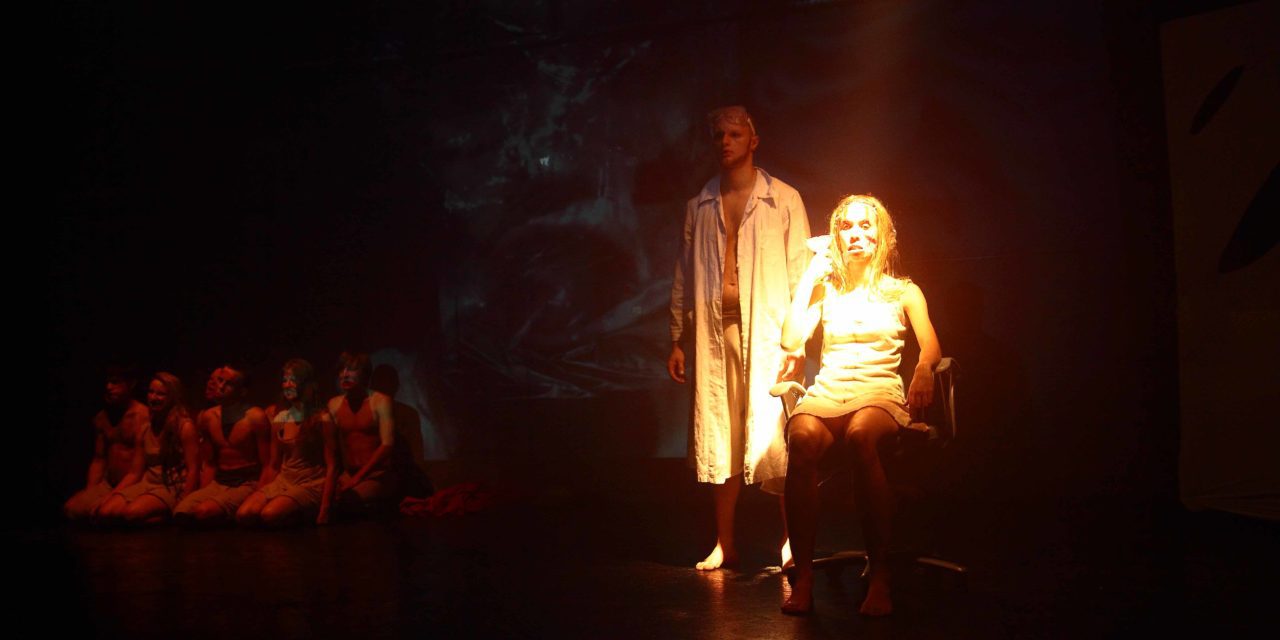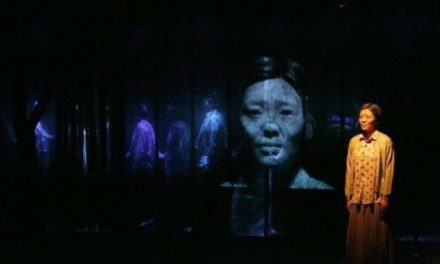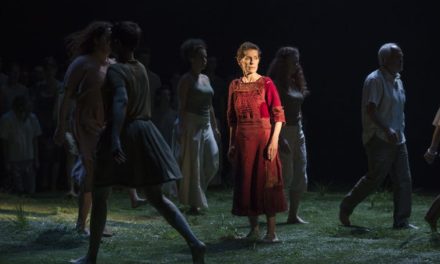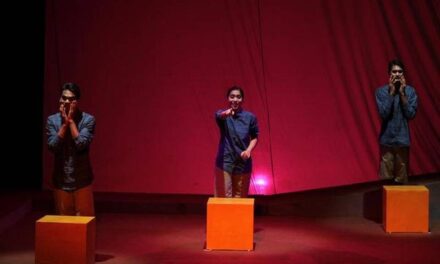After the enormous Oratorium Dance Project, in 2011, no one wanted to stop working with the Łódź students and adults who had just come into Teatr Chorea‘s orbit. Two directors–Tomasz Krzyżanowski for the singers, and Janusz Adam Biedrzycki for the dancers–continued to meet with their performers and build new work.
Sub-choruses were formed: the Wielki Chór Młodej Chorei (Great Choir of Young Chorea) and the dance troupe Brzydal (Ugly). In 2013, two shows emerged: Gilgamesz and the self-titled Brzydal, proving there was life for the choruses after Oratorium. These pieces, which I will discuss here, were presented on the second day of Retro//Per//Spectives 2014.
Full disclosure: I sing in Gilgamesz and helped with text-wrangling for both pieces. I cannot speak unbiasedly about Chorea, any more than a barnacle can about a whale it rides through the ocean for two years. But I am the only person likely to provide an English-language portrait of this work. Consquently, I will try, as usual, to make up in detail what I lack in impartiality.
Again, I’ll proceed backwards from the end of the day to the beginning.
This piece is part of an ongoing series: the previous installments can be found here and here.
R//P//S 2014, Day 2: Friday, August 22, 2014
V. 11:30 PM: Aftermath.
The black-skirted Gilgamesz choir dives backstage, to be met by a gaggle of joyous Oratorium veterans. Tearful hugs. The dancers always come to support us: they still feel like we’re all part of the same giant chorus, even as we perform on separate stages more and more often.
We take off our capelike skirts, fold them with name tags facing out, and go home. There is an “Open Night of Music” jam session tonight at midnight in the Art_Inkubator: I see a man with a violin case in the hallway. A group of instrumentalists are waiting on gray leather couch-chairs. I’d like to stay, but I am fading, and know I need to collapse more than I need to jam. I get myself home: I don’t remember how.
IV: 10 PM: Gilgamesz in the Art_Inkubator
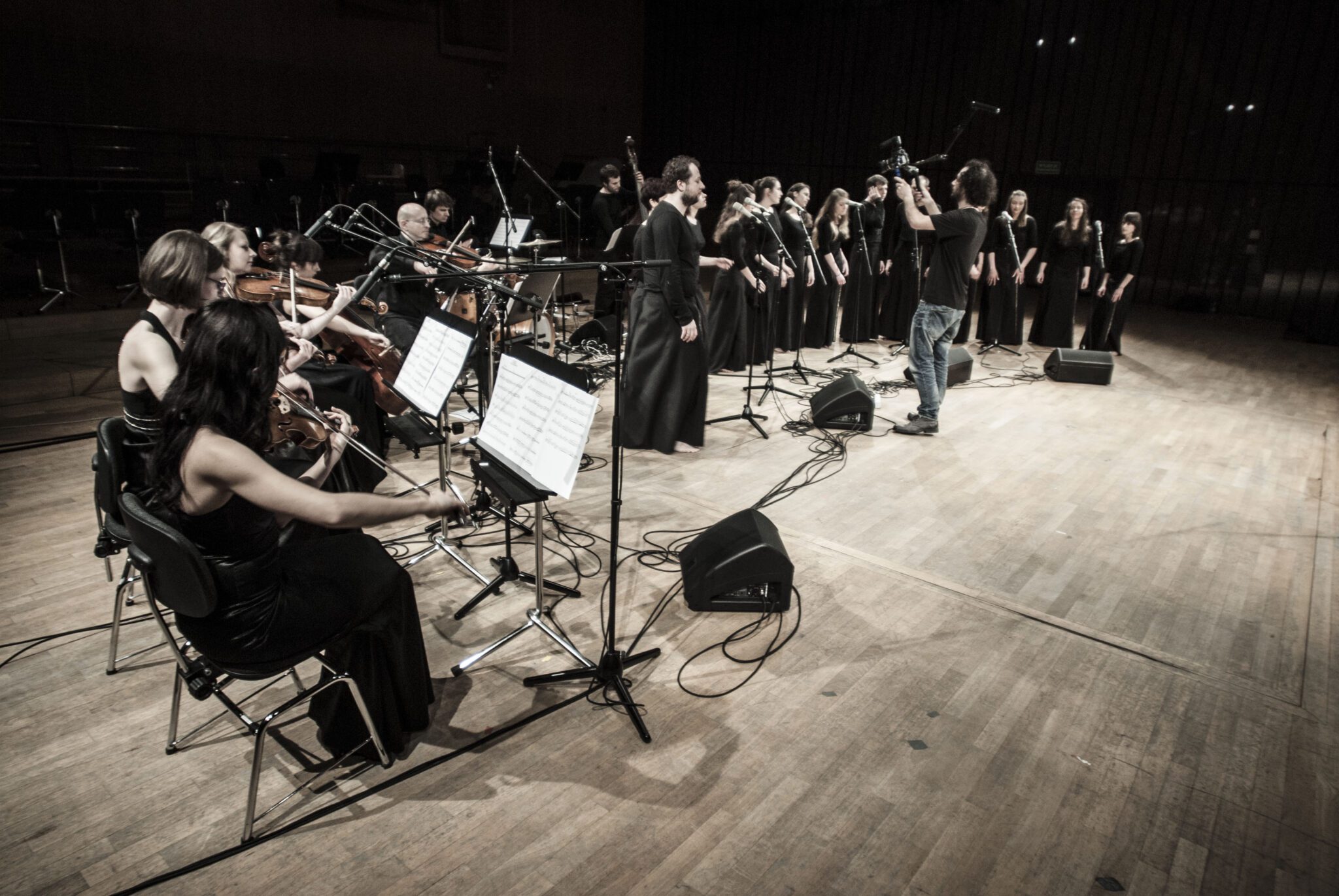
Gilgamesz by Teatr Chorea (2013). Photo by Teatr Chorea
No time to look at the audience. Composer Tomasz Krzyżanowski immediately sings the first notes of Który głębie widział (“Who has gazed into the depths”): an alternating “Oh, oh; oh, oh,” the bass line of the a cappella song. Voice after voice joins until all thirteen are praising Gilgamesz, powerful ruler of Uruk, who has gotten out of control–rampaging, stealing sons from their families, fighting, making love to too many people.
This is my most challenging piece. If my voice lasts through the song, I know I will survive the show. I imagine that my section partner Joanna Chmielecka and I are on a chariot in a procession in ancient Uruk, dressed in ceremonial robes, and that we’ve been performing this song together since we were teenagers. The visualization works. I do not lose my voice.
In the next song, Ipzirunimma, Gilgamesz’s mother interprets his dream: she tells him he will meet a friend, a man who can match his strength. “You will find him and bring him to me,” she commands. This song introduces the ancient Akkadian language: it has no “o” vowel and is filled with soft “sz”s. (We would write it as “sh” in English; I will follow Polish spelling of Akkadian throughout this article.) Ipzirunimma is decorated with an elusive, incantatory clapping rhythm that we repeat in every nine-beat measures. We want to cast a musical enchantment, send the audience thousands of years back in time.
The next two songs, Szamhat and Szicba, have a slower, more legato storytelling pace. The sexy warble “Szamhat” praises the woman who slept with the wild man, Enkidu, and tamed him. In “Szicba,” the hair is shaved from Enkidu’s body; he is washed and clothed. Szicba sza namaszti itennik, (the milk of animals he used to suck), we chant.
Krzyczała ziemia (the heavens cried out) is the shortest and most intense song in Gilgamesz: two minutes of seven-beat measures with clapping throughout. We describe the ominous weather before the battle with the monster Humbaba, guardian of the Cedar Forest. The white clouds became black; the rain of death fell. After this song, nothing will be the same for our heroes. Gilgamesz and Enkidu have offended the gods by killing too many monsters, including the Bull of Heaven. There will be consequences. Enkidu will be sacrificed.
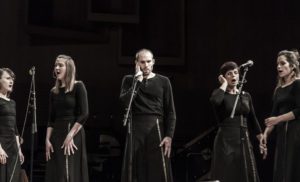
Gilgamesz by Teatr Chorea (2013). Photo by Teatr Chorea
In two back-to-back sad songs, Dom Pyłu (The house of dust) and Śmierć Enkidu (The death of Enkidu) Enkidu’s demise is anticipated and mourned. Gilgamesz’s grief is unquenchable. He goes to the Maszu Mountain, seeking the wise, grizzled Utnapisztim, who knows everything about death and the gods–to learn how to bring Enkidu back to life.
Gilgamesz confronts the terrifying scorpion-beings who guard the entrance to the mountains. He forces his way past them to Utnapisztim, and asks for Enkidu to live again. But even the wise man will not contemplate bringing back the dead. Like a guru–like Grotowski, for example–Utnapisztim does not answer the question you ask, but the one you should have asked. In Arka, in response to Gilgamesz’s entreaty, he tells the story of a great world-destroying flood. (This is another representation of the myth we know as Noah’s Ark.)
The piece ends with “Ibri Sza.” It’s Akkadian set to contemporary jazz, classical, and even slightly rock-inflected idioms. The previous Akkadian songs had ancient-sounding music, but now Gilgamesz’s grief has brought the story closer to us. We have all lost people, like he has; he is one of us. Gilgamesz moans in long, stretched-out vowels. And then, advised by a wise crone figure, he is told–in a much faster rhythm–to embrace his life, take a wife and be happy, and to not be lost in grief. “Such is the destiny of mortal men”: to live.
That’s it. It always goes by so quickly. An encore of the crowd-pleasing scorpion-being song ends the night. Now it may be months–even a year–before we sing these words again.
There are benefits to Chorea working in a smaller city: space in a converted factory, local media attention, city government support, appreciative audiences. But there are drawbacks. Fewer invitations to perform. Producers, festival organizers, and nationally read critics from the big cities in Poland can easily ignore Łódź productions.
My far-from-impartial opinion, for whatever it’s worth, is that they are missing something by not hearing Krzyżanowski. He’s surpassed the post-Grotowski idea of reconstructed Greek choruses to make something contemporary and original. His rhythmically complex music engrosses audiences. As I have been told by numerous guests whom I’ve invited to his shows since 2011, “I had no idea it was going to be that good.” The work is also compelling for performers. I’ve been knocking around various choirs since I was a child. I’ve never sung anything so exhilarating as Gilgamesz–and I’ve sung in Carmina Burana.
Krzyżanowski is young, in his 30s. The exposure he needs may come with time. What he has already achieved is envy-inducing. He has a choir of devoted singers; almost everything he writes is performed; local audiences attend, in force. Łódź enthusiastically appreciates his music. Someday Warsaw and Kraków–or, why not, London and Berlin–may also become interested in what he is doing.
III. 8 PM: Pre-Gilgamesz rehearsal
We go across the Inkubator hall to rehearse the two a cappella songs, including my stumbling block, Który głębie widział (“Who has gazed into the depths”), during which I self-destructed in our last rehearsal. This time, even with my throat rough as the unfinished wood floor, I force myself through the piece. We finish and go to wrap ourselves in black fabric. The dressing room is crowded. Nowhere to sit. Naked legs and mistied skirt bows. Nervously drinking water and scrunching hair.
Almost ten. The audience has been let in. The wall above the dressing room has an air vent to the performance space; they will hear us. We are shushed. But the whispering chorus is, as usual, irrepressible. Tomasz Rodowicz meets us backstage. He holds one arm in front of us like a bar blocking off train tracks, waiting to tell us when to enter. The string players are already onstage, tuning. We clear our throats. Rodowicz lifts his arm: the signal. Go.
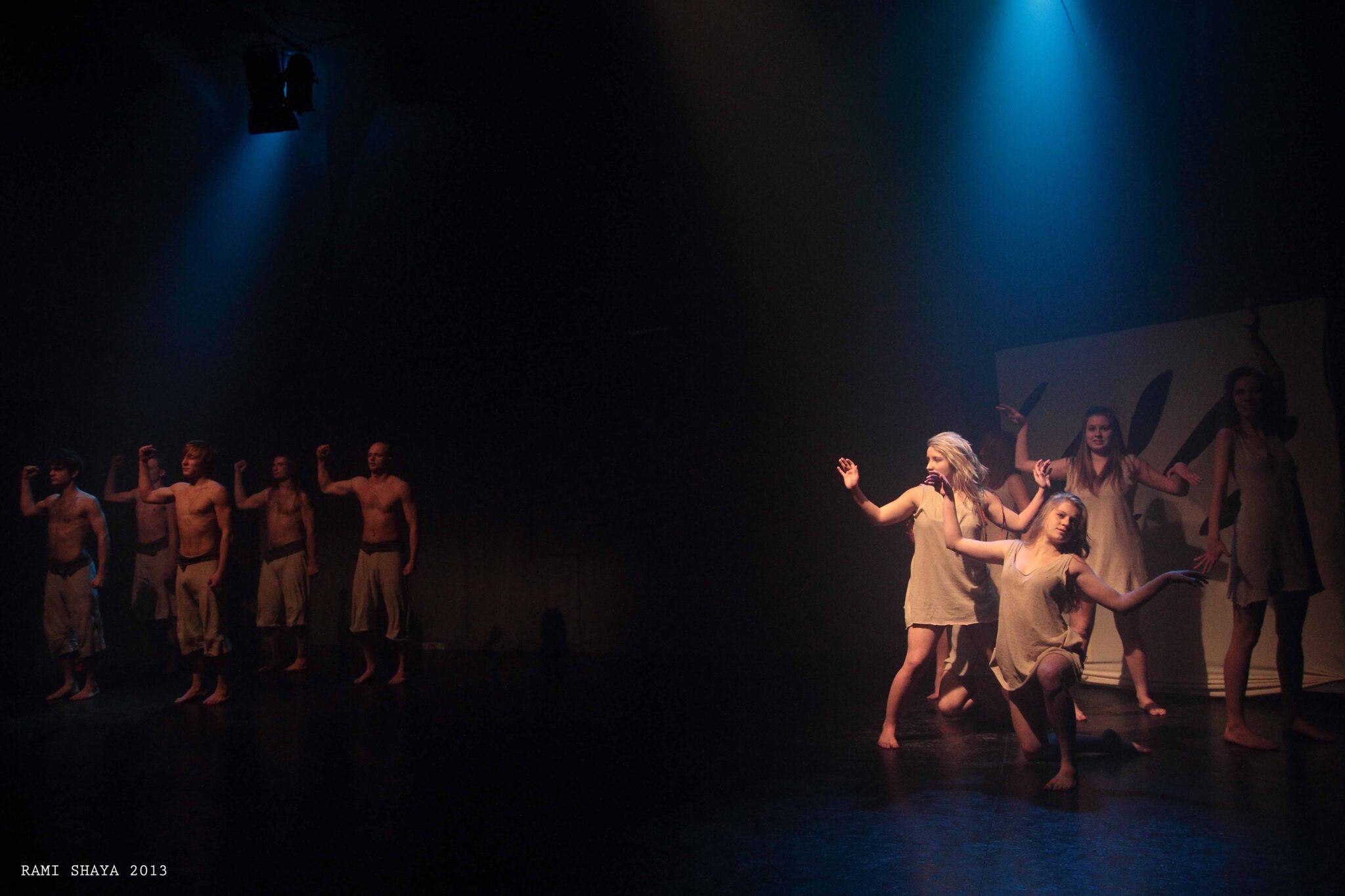
Brzydal (2013) by Teatr Chorea (2013). Photo by Rami Shaya
II. 5 PM: Brzydal
While I’m at home refueling for tonight’s Gilgamesz, I miss seeing the dancers perform their seminal 2013 work, Brzydal, that defined their identity as an independent chorus after Oratorium. I am sad to not be there to support them in person. However, I’ve seen the piece numerous times, and I am certainly not going to pass up the chance to talk about it during this R//P//S blog.
Brzydal (Ugly), by choreographer Janusz Adam Biedrzycki with Magdalena Paszkiewicz, is about the ways in which we distort ourselves. At the beginning, the chorus sits, staring at a TV or mirror. The dancers rearrange their faces, unsatisfied with their appearance. Derrieres glued to the ground, they tweak cheeks and shove their jaws and foreheads from side to side.
In a dance club, people lunge, gyrate, preen; they jump in unison. This positive energy doesn’t last. The tall, impossibly elastic-bodied Aleksandra Kacprzak has a lolling solo against a wall. She leans about in a lonely stupor. Damian Kukiałka’s shirtless body is attacked, devoured, and carried overhead like a Bacchanalian trophy.
A humorous interlude, a parody of exploitative TV talk shows, follows. Dancers parade on with modified bodies–up on stilts with a floor-length dress, or with two people shoved into one T-shirt. It’s a procession of “monsters” and “freaks”: the world’s tiniest person, conjoined twins, etc. Singer-hosts Milena Kranik and Jakub Pałys provide live music and commentary.
Kacprzak presents herself, with submissive enthusiasm, to having her face suffocated in half a roll of Saran Wrap. Her mouth is stuffed and propped open like a rabbit’s for product testing. Sharpie circles are drawn to indicate places for surgical incision: the lines give her a fun-show clown’s exaggerated features. She is a ghoulish martyr.
Lights dim. When they come back, the stage is empty except for a foot-tall Mason jar downstage, containing something creepy-looking in liquid. Dead baby? Autopsied brain? It’s one of the most unsettling transitions I have ever seen. Somehow, the absent dancers have been compressed into that jar. We have made ourselves, Biedrzycki and Paszkiewicz imply, into dehumanized laboratory specimens, through our obsession with beauty and Brzydal.
I: 10 AM – 2 PM: Gilgamesz rehearsal
Morning in the Inkubator: a continued celebration of the success of Rytm języka. We congratulate our tired colleagues. But we have to keep working. The ten out of thirteen of us who were in last night’s premiere have crammed their brains with new music, and they now need to somehow remember the older Gilgamesz. We focus on work, and the rehearsal slips by. My voice, though not perfect, survives. I am hopeful I will be able to generate notes that evening.
It’s time to iron our costumes. We all wear floor-length black wrap around skirts, made by singer Anna Przybyt. They look great, but it’s like ironing a bedsheet. I think about all the other places I’ve stood while ironing this skirt. In our dressing room at the Łódź Philharmonic…at the White Synagogue (now a converted performance space) in Sejny, Poland…at the Festival of Theatrical Music in Jelenia Góra…
In the afternoon, there is a long break. There are other shows happening, but I am trying to save my energy and not get sick. I go home, make myself the largest meal I think I can digest before the show (chicken, potatoes, tomato and cucumber salad), shower, cover my hair in a quart of mousse and gel, and return to the theater with two bottles of water and a package of throat lozenges. The city of Uruk is waiting.
Dara Weinberg is a writer/director, originally from Los Angeles. She studied Polish theater on a Fulbright grant from 2011-2013; she now lives in Kraków. She is working on a book about her experiences with Poland, theater, and Teatr Chorea.
This post was written by the author in their personal capacity.The opinions expressed in this article are the author’s own and do not reflect the view of The Theatre Times, their staff or collaborators.
This post was written by Dara Weinberg.
The views expressed here belong to the author and do not necessarily reflect our views and opinions.

